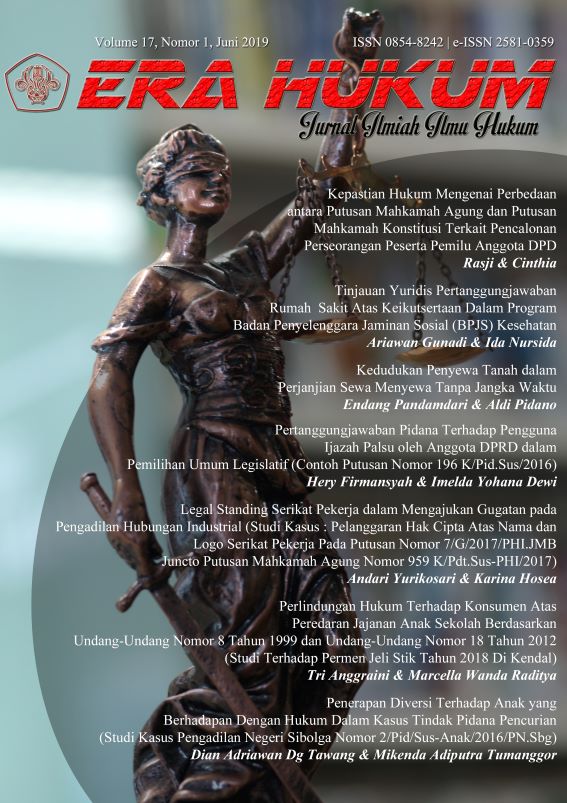PERTANGGUNGJAWABAN PIDANA TERHADAP PENGGUNA IJAZAH PALSU OLEH ANGGOTA DPRD DALAM PEMILIHAN UMUM LEGISLATIF (CONTOH KASUS PUTUSAN NOMOR: 196 K/PID.SUS/2016)
Isi Artikel Utama
Abstrak
A diploma is usually used as one of the conditions to meet the requirements for registration or recruitment from a position. For example, for the nomination of legislative members to be members of the DPR, DPD, Provincial DPRD and Regency DPRD. However, most legislative candidates in the regions do not have genuine diplomas for certain reasons, eventually the legislative candidates use fake diplomas in order to qualify in the general election. The problem studied is how criminal accountability of fake diploma users by DPRD members in legislative elections (Case Example Decision Number: 196 K / Pid.Sus / 2016)? The research method that I use is a normative legal research method which is also supported by interview data. The author analyzes that criminal liability is adjusted to the condition that a person can be held accountable based on criminal acts committed and articles used where the sanctions are there, in this case the article imposed is Article 69 paragraph (1) of the Law on the National Education System. When viewed from a decision that is used as an example by referring to its legal considerations, a court judge has considered everything so that he can be held to hold criminal responsibility and the judge has the right to decide. The author advises to conduct socialization so that there is no indication of the use of fake diplomas, it is necessary to impose a severe sentence for each actor, and the legislative candidates to be honest in nominating themselves as representatives of the people.
Rincian Artikel
Penulis yang mempublikasikan jurnal ini setuju dengan ketentuan sebagai berikut:
- Penulis mempertahankan hak cipta dan memberikan jurnal hak publikasi pertama dengan pekerjaan secara bersamaan berlisensi di bawah Creative Commons Attribution yang memungkinkan orang lain untuk berbagi pekerjaan dengan pengakuan kepengarangan karya dan publikasi awal di jurnal ini.
- Penulis mampu untuk masuk ke dalam terpisah, pengaturan kontrak tambahan untuk distribusi non-eksklusif versi diterbitkan jurnal pekerjaan (misalnya, posting ke sebuah repositori institusi atau menerbitkannya dalam sebuah buku), dengan pengakuan publikasi awal di jurnal ini.
- Penulis diizinkan dan didorong untuk mengirim karya mereka secara online (misalnya, dalam repositori institusi atau website mereka) sebelum dan selama proses pengiriman, karena dapat menyebabkan pertukaran produktif, serta sebelumnya dan kutipan yang lebih besar dari karya yang diterbitkan.
Referensi
A. Buku
Chazawi, Adami. Kejahatan Mengenai Pemalsuan. Jakarta: PT Raja Grafindo Persada, 2002.
Lamintang. Dasar-Dasar Hukum Pidana Indonesia. Bandung: Sinar Baru, 1984.
Nawawi, Muladi Barda. Teori-Teori dan Kebijakan Pidana. Cetakan ke-2. Bandung: Penerbit Alumni, 1992.
Viswandro, dkk. Mengenal Profesi Penegak Hukum. Cetakan ke-1. Yogyakarta: penerbit Medpress Digital, 2015.
Prodjodikoro, Wirjono. Asas-Asas Hukum Pidana di Indonesia. Edisi kedua. Bandung: Eresco, 1986.
B. Artikel Jurnal Online
Karinda, Angel Michelle Karinda. “Kajian Yuridis Terhadap Tentang Pemalsuan Pemalsuan Ijazah Menurut Pasal 263 dan 264 KUHP”, Lex Crimen Vol. V Tahun 2016.



